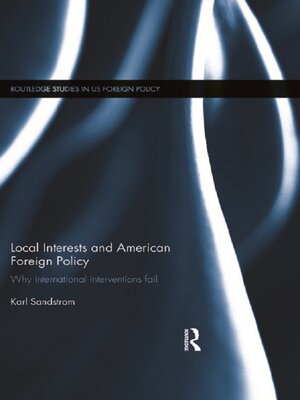Local Interests and American Foreign Policy
ebook ∣ Why International Interventions Fail · Routledge Studies in US Foreign Policy
By Karl Sandstrom

Sign up to save your library
With an OverDrive account, you can save your favorite libraries for at-a-glance information about availability. Find out more about OverDrive accounts.
Find this title in Libby, the library reading app by OverDrive.



Search for a digital library with this title
Title found at these libraries:
| Library Name | Distance |
|---|---|
| Loading... |
This book provides an alternative perspective on how social interest-groups form and interact to affect interventions. It combines historic, sociological and international relations perspectives in a framework through which to view the relevant socio-political dynamics in 'target societies'. At a time when American foreign policy seeks to redefine its objectives and its methods of intervention, the monolithic ideological assumptions of the state as the panacea to all social ailments, both as a format and a vehicle of norm delivery, seemingly dooms American foreign policy and European allies, to the repetition of old mistakes.
In environments where interests and priorities are shaped on a highly localised basis, interventionist agendas often lack relevant meaning. The book focuses in particular on the contrast between the assumptions inherent in 'Western' interventionist strategies and social interest formation in Afghanistan, Somaliland, and Somalia. Based on extensive fieldwork, the book draws on available literature and on interviews with local population or international aid and development workers. The conclusion is that in the cases examined, the agency of local interest groups largely controls the outcome of external strategies.
This book will be of great interest to students and scholars of US Foreign Policy, International Relations and Security Studies.







